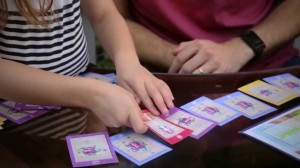Game Crawl: Explore the Power of Learning via Play
I love games. Not only are games a lot of fun, but they are also a great way for people to learn. Any time I look at how a game enhances learning, I ask myself two questions.
What Do Players Learn Through Play?
Most people don’t think about games in the context of learning. They think about games in the context of fun, and rightfully so. But people do learn a tremendous amount during playing of the game.
Games can help players learn basic concepts and facts, how to apply complex critical thinking, or anything in between. Lifehacker recently released an article highlighting 15 games that are great for learning. Some of the games listed, and what they help people learn, included:
 Chess: foresight, strategic thinking
Chess: foresight, strategic thinking- Ticket to Ride: Stratigic thinking, geography
- Dixit: Creative thinking, storytelling
- Scrabble: spelling, math
- Agricola: Problem-solving skills
- Pandemic: Problem solving, teamwork
Most importantly, these games are fun. They are not teaching-tools poorly disguised as games. They are games that, through play, help people learn and develop new skills.
What Can I Learn From the Game’s Design?
I also look at games with an instructional design mindset. What makes the game so engaging? How does the design intentionally help people build skill?
Take Angry Birds, one of the most popular games in the world right now. Sure it’s fun, but have you ever looked at it’s design? There are plenty of lessons instructional designers can take from that game, including:
- You start with a single bird to use, with no special abilities. As you pass levels, new birds with new abilities are added to the mix. LESSON: Start simple and allow practice to develop mastery before introducing new skills.
- There are very limited instructions. You learn to play Angry Birds by playing it. LESSON: Let people learn by doing, providing them only the minimal instruction to get started.
- There’s no single way to beat a level. LESSON: Allow people the opportunity to solve problems in different ways.
(I wrote a post on my personal blog a while back exploring the lessons we can learn from Angry Birds in more detail – it’s linked at the bottom of this post.)
 I recently purchased a game called Robot Turtles for my kids. It’s like a case study in designing a game to help kids learn and develop a skill. The game reinforces basic concepts that apply to writing code, but the game has NOTHING to do with coding. It’s a great example of a game designed from the ground-up for the purpose of helping players learn something and develop a skill. (I recently blogged about this on my personal blog – a link is available at the end of this post.)
I recently purchased a game called Robot Turtles for my kids. It’s like a case study in designing a game to help kids learn and develop a skill. The game reinforces basic concepts that apply to writing code, but the game has NOTHING to do with coding. It’s a great example of a game designed from the ground-up for the purpose of helping players learn something and develop a skill. (I recently blogged about this on my personal blog – a link is available at the end of this post.)
At this month’s Learning Solutions and Ecosystem 2014 conferences in Orlando, we’ll be exploring how people can learn through gaming at the second annual Game Crawl, an evening of learning, play, and fun. It is hosted by Stevie Rocco, Karl Kapp, and me and takes place on Wednesday March 19th, from 6:30pm – 8:00pm in the Hilton Hotel bar.
I’ll be bringing some of my favorite games to Orlando, including Fluxx, Forbidden Island, Quoridor, No Thanks, Qwirkle, and more. If you’re attending this year’s Learning Solutions Conference and Expo or Ecosystem 2014, I hope you can join us at this year’s Game Crawl!
Related Articles
15 Fun Board Games that Exercise Your Brain And Make You Smarter
Robot Turtles: Game-Based Learning at it’s Finest
What can Angry Birds teach us about Employee Learning and Performance?

Leave a Reply